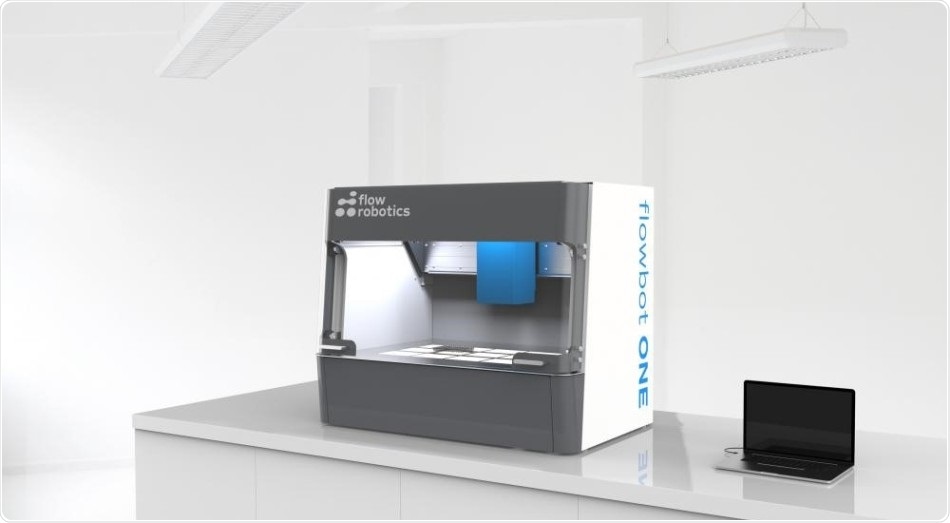A Danish pipetting robot is automating Covid testing processes in hospitals around Europe. The robot, called flowbot ONE, significantly reduces the time it takes for laboratories to produce results for patients to tell them whether they are infected with Covid-19.

The Danish manufacturer Flow Robotics can trump the other players on the international market in terms of usability, price and delivery time
A unique liquid-handling robot from Denmark is now speeding up the great task of analyzing Covid tests. Every day thousands of tests for Covid-19 are now being prepared for analysis by the sophisticated flowbot ONE from Flow Robotics. Robot technology minimizes the risk of human error and contagion in the process, and it reduces the physically demanding pipetting tasks for laboratory personnel around the world.
Eight Danish hospitals have chosen the Danish invention, which is also being used by their partners DTU and Novo Nordisk. A German laboratory which had actually purchased the Danish robot to test for salmonella in food is now also using flowbot ONE when samples from German patients need to be analysed. Orders for the Danish liquid-handling robots have also come from Sweden, Poland, Russia, the Netherlands and Australia. Flow Robotics’ home in Denmark is not the only place where the health authorities have discovered the potential of automating part of the testing effort during the coronavirus pandemic. The Danish manufacturer Flow Robotics can trump the other players on the international market in terms of usability, price and delivery time. In just three weeks, Flow Robotics can manufacture, supply and install 12 robots ready for use.
Consultant physician Jens Otto Jarløv, who works at Herlev Hospital in Denmark, is delighted to be able to automate processes in his laboratory:
"We are really pleased that Flow Robotics can deliver their robots so quickly. They are innovative and can automate just the things we need. We are very satisfied, and the co-operation has been very good," he says.
The flowbot ONE robot enters the process right after inoculation, so to speak, where it automates the whole task of preparing samples for analysis, which is about mixing liquids and chemicals.
Since the beginning of May 2020, Flow Robotics has been helping to optimize the intensive work of analyzing coronavirus samples in Denmark.
Although people’s eyes have been opened to the potential of our technology by the sad sight of a world ravaged by the pandemic, we are pleased to be able to make a difference for both patients and staff."
Annika Isaksson, CEO of Flow Robotics
In line with its global expansion, the company is scaling up robot production and recruiting new employees.
At Herlev Hospital, molecular biologist Martin Friis now works side by side with the Danish flowbot ONE robot:
"The robot pipettes the live virus, and it can pipette several samples at once, so we are now saving a lot of repetitive work and reducing the risk of accidents. We already keep ourselves safe, but it is still good for us to have less contact with the live virus thanks to the robot. The risk of pipetting errors is also eliminated as a result of automation because the robot follows a pattern and avoids mistakes. All in all, this lowers the stress level for us on many fronts, so we have less hassle in our work and minimize potential errors," he says.